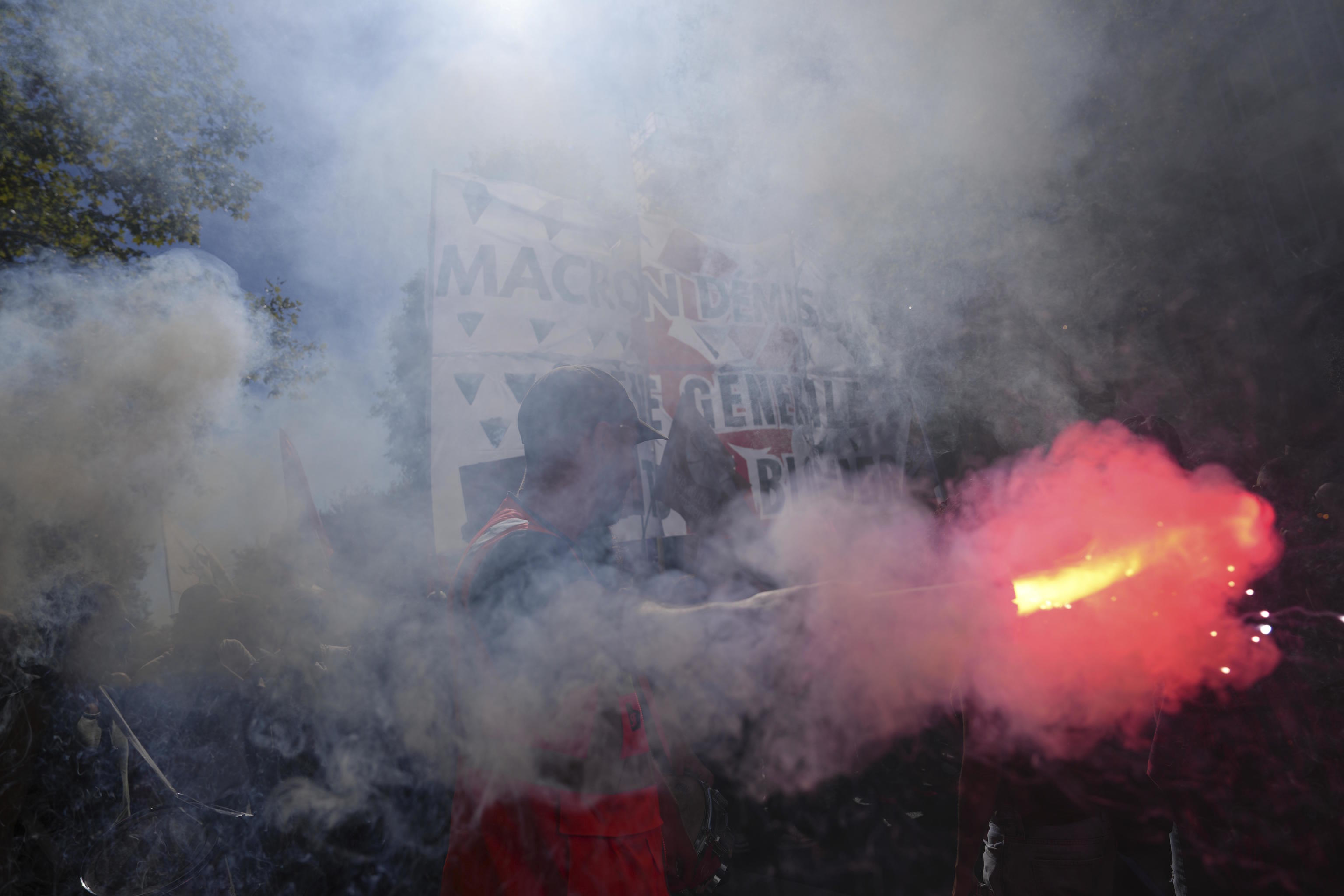The general strike called for September 18 by eight major unions has not managed to paralyze France, although it did mobilize over half a million protesters in the streets, according to authorities (one million, according to organizers). Banners and chants of "Social Justice!", "Tax the Rich!", and "Macron, explosion!" have echoed through major cities in response to the austerity budget that led to the resignation of Prime Minister François Bayrou.
The new Prime Minister, centrist Sébastien Lecornu, faces his first test on the streets, as he has not yet been able to form a new coalition government amidst popular anger against Emmanuel Macron, who is now the most unpopular president of the Fifth Republic.
Over 80,000 police officers have been deployed nationwide by outgoing Interior Minister Bruno Retailleau, who confirmed midday that the impact of the general strike - called in sectors such as transportation, energy, education, and healthcare - had a "lesser impact than feared".
The demonstrations, like the one that brought together over 100,000 people from Bastille to Republic Square in Paris - official estimates were 55,000 attendees - were mostly peaceful. By mid-afternoon yesterday, over 300 arrests had been made in clashes with the police, with Paris, Marseille, Lyon, and Nantes as hotspots.
In the French capital, incidents were reported on Voltaire Boulevard, where several protesters vandalized bank branches. Tear gas was also deployed early on in a blockade action at the Ministry of Economy in Bercy, which was dismantled by the police. In Lyon, a police officer and a television journalist were slightly injured.
Bruno Retailleau blamed the violent actions on "ultra-leftist groups infiltrated among the protesters." "Deploying such police force is like adding fuel to the fire," stated Sophie Binet, general secretary of the CGT. "The vast majority of protesters are peaceful, and the violence is precisely caused by the strategy to maintain public order."
Binet joined the Paris march, transformed into a river of orange and red vests from the unions, reminiscent of the yellow vests that paralyzed the country in 2018 in protests against fuel price hikes. Wearing her white vest from the Sud Santé union, nurse Blanche Leroy joined the street march early on: "At my hospital, half the people went on strike, the other half didn't join out of fear. This is how politicians defend themselves, by intimidating and squeezing people who are already on the edge."
"I'm not sure if this will lead to a new major social movement, but people are very fed up with the situation and there is a strong desire for social and fiscal justice," declared activist Jean-Baptiste Redde at the start of the Paris demonstration, holding one of his famous protest banners: "Politicians live beyond our means."
Dozens of picket lines were set up early in the morning at school entrances. The general strike was supported by 17% of public school teachers, according to the ministry. In the healthcare sector, there were symbolic sit-ins by pharmacists. In the transportation sector, participation varied: the Paris metro continued to operate, although there were delays and minor incidents at train stations and airports.
Edf confirmed that the strike had affected power generation at two thermal plants (Blénod and Martigues) and three nuclear plants (Saint-Alban, Flamanville, and Sint-Laurent), although the impact on household electricity supply was minimal.
The mobilization was largely supported by left-wing forces, especially by Jean-Luc Mélenchon's La France Insoumise. Meanwhile, Socialist Party leader Olivier Faure met with the new Prime Minister, Sébastien Lecornu, on Wednesday and warned upon leaving: "On the eve of a major social mobilization, the message we conveyed is that the French want to see a change in their lives."
The Socialist Party has made the so-called Zucman tax (promoted by economist Gabriel Zucman) its social flagship, aiming to impose a 2% tax on fortunes over 100 million euros, a measure supported by the majority of French citizens in polls and already debated in the Senate.
Meanwhile, unions have condemned the budget announced in July by François Bayrou as "brutal for workers" and are not satisfied with Lecornu's announcement of abandoning the elimination of two public holidays. The budget, with social cuts estimated at 43.8 billion euros, included a one-year freeze on pensions and social benefits, the dismissal of thousands of civil servants, and a reduction in healthcare spending.
The social mobilization occurs against a backdrop of great economic uncertainty, precisely due to the political instability in the country. France's risk premium, with the third-highest public debt in the eurozone (114.1% of GDP), surpassed Italy's last week. Rating agency Fitch subsequently downgraded France's debt rating from AA- to A+. The Bank of France slightly revised upward its GDP growth forecast to 0.7% for the year but lowered expectations for 2026 and 2027, with presidential elections on the horizon.
"The demands of the unions are at the center of the discussions I am having to form a government," stated Prime Minister Sébastien Lecornu at the end of the intense day.
